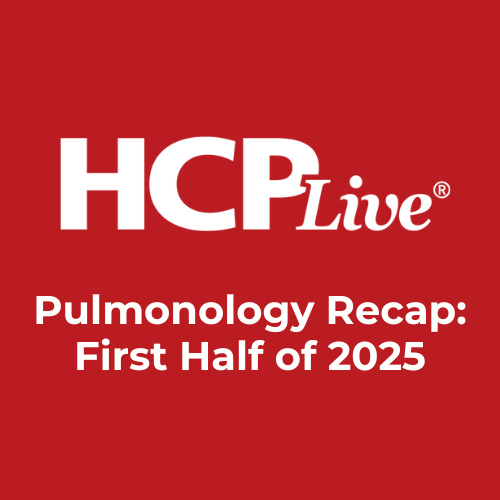The first half of 2025 marked a dynamic period in pulmonology, with major FDA milestones, promising trial readouts, and continued momentum in precision medicine for respiratory conditions. Most notably, the FDA granted landmark approval to mepolizumab as the first biologic for eosinophilic COPD, signaling a shift toward more targeted treatment for a challenging COPD phenotype. Other regulatory progress included FDA acceptance of a gene therapy BLA for recurrent respiratory papillomatosis, an ultrarare disease with no approved treatments, and encouraging steps toward new therapies for pulmonary arterial hypertension and progressive pulmonary fibrosis.
Meanwhile, clinical pipelines produced a mix of breakthroughs and setbacks. Positive results for TPIP and brensocatib suggested new hope for patients with PAH and bronchiectasis—2 historically underserved populations. Nerandomilast also showed statistically significant benefit in progressive pulmonary fibrosis, potentially expanding options for this debilitating disease. However, tezepelumab failed to meet its endpoint in a COPD trial, underscoring the complexity of inflammation-driven phenotypes.
Check out this H1 2025 pulmonology month in review for a recap of HCPLive’s coverage of the top pulmonology news and research from the past few months:
Regulatory Actions in H1 2025
FDA Approves Mepolizumab for Eosinophilic COPD
On May 22, the FDA has approved mepolizumab (Nucala) as an add-on maintenance treatment for patients with COPD with an eosinophilic phenotype. In the phase 3 MATINEE trial, mepolizumab demonstrated a statistically significant and clinically meaningful 21% reduction in the annualized rate of moderate or severe exacerbations (0.80 events per year) compared to placebo (1.01 events per year; rate ratio, 0.79; 95% CI, 0.66 to 0.94; P = .01), successfully meeting the primary endpoint.
Related content: Expanding Precision Medicine in COPD With Mepolizumab, with Frank Sciurba, MD
FDA Accepts BLA for PRGN-2012 for Recurrent Respiratory Papillomatosis
On February 25, the FDA accepted Precigen, Inc.’s BLA for PRGN-2012 (zopapogene imadenovec), an investigational gene therapy targeted for adults with recurrent respiratory papillomatosis (RRP), a rare disease that requires repeated surgeries with no current therapeutic alternative. A Prescription Drug User Fee Act (PDUFA) action date of August 27, 2025, was set, with no plans to hold an advisory committee meeting.
H1 Data Readouts
Merck Halts Phase 3 HYPERION Trial of Sotatercept for Final Analysis
On January 30, Merck halted the Phase 3 HYPERION trial evaluating sotatercept-csrk (WINREVAIR) versus placebo in adults with recently diagnosed PAH and plans to proceed with the final analysis. Merck indicated the decision to stop HYPERION before its scheduled end date was based on positive data from the interim analysis of ZENITH and an overall review of data from the sotatercept clinical trial program.
Tezepelumab Fails Study Endpoint of Reducing Moderate-to-Severe COPD Exacerbations
Tezepelumab was not seen to reduce the annualized rate of moderate or severe COPD exacerbations, thus failing the primary endpoint of COURSE, a phase 2a trial (NCT04039113). Singh and colleagues found that the annualized rate of moderate or severe COPD exacerbations represented a nonsignificant change and thus did not meet the trial’s primary endpoint.
Nerandomilast Meets Primary Endpoint in Improving FVC in Progressive Pulmonary Fibrosis
Nerandomilast met the primary endpoint in the Phase 3 FIBRONEER-ILD trial, significantly improving forced vital capacity (FVC) among individuals with progressive pulmonary fibrosis (PPF), compared with placebo. Based on these findings, Boehringer Ingelheim announced plans to submit an NDA for nerandomilast to the FDA.
Brensocatib Improved Outcomes, Slowed Decline in People With Bronchiectasis
In April, Brensocatib showed efficacy in reducing pulmonary exacerbations and slowing disease progression in patients with non-cystic fibrosis bronchiectasis. The positive results from the Phase 3 trial suggest brensocatib could become a novel therapeutic option for this underserved population.
Related content: Investigating Brensocatib, Potential First Treatment for Bronchiectasis, with James Chalmers, MBChB, PhD
TPIP Boasts Significant Outcome Improvements for PAH in Phase 2b
In June, Insmed announced positive phase 2b results for treprostinil palmitil inhalation powder (TPIP), meeting its primary endpoint of significantly reducing pulmonary vascular resistance in patients with pulmonary arterial hypertension (PAH). Based on findings from a randomized, placebo-controlled trial, TPIP treatment led to notable improvements in exercise capacity and biomarkers of heart strain, supporting its potential as an effective once-daily prostanoid therapy. Safety analysis showed TPIP was generally well tolerated despite higher rates of common prostanoid-related adverse events like cough and headache. Insmed plans to initiate phase 3 trials for TPIP in PAH and pulmonary hypertension associated with interstitial lung disease starting later this year and into early 2026.
